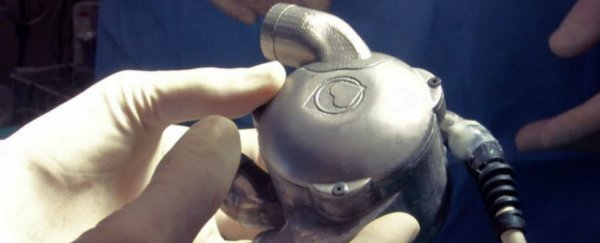Australian researchers have invented a new type of bionic heart that pumps blood around the body without a pulse. Named BiVACOR, the device has been successfully implanted in a sheep, and works so well, researchers are hoping to run human trials in just three years.
Not only does the device last for up to a decade, but it's smaller, and less susceptible to wear and tear than current artificial hearts. "There were other devices that were quite large, and they also would break quite easily," one of the team Daniel Timms, formerly from the Queensland University of Technology, told Jorge Branco at The Brisbane Times. "And the reason they would break is they would have a sac, so if you're beating them billions of times per year, they're going to break."
BiVACOR is a relatively simple device, made from two titanium centrifugal impellers - or discs - placed on a single rotor. These discs spin together at 2,000 revolutions per minute to smoothly push incoming blood through the other end of the device, which is "a significant departure from traditional pulse-based designs, which included balloon-like sacs to pump blood", says Branco.
Because the device contains just one moving part - the rotating discs in the middle - there's very little in it that can wear down and malfunction. The device was transplanted into a live sheep in January, and so far, so good. Just a little titanium disc spinning inside, keeping the sheep alive, most importantly, and also perfectly healthy.
Here's how it works:

"We've now shown that the device works. This idea is viable. Now it's a matter of making it robust and reliable so that it works in a patient," Timms told Branco. "The time frame is three to five years before it could be ready for humans. Proving the concept was the first real hurdle. There are many to go from here but we're confident we have the collaborative team to take it to that next level."
With heart failure affecting 300,000 Australians at any given time and 1.1 million people across the US and Europe, this is pretty exciting. Especially when you think about how just 4,000 donor hearts are available globally each year. We need something like this. Let's see what the clinical trials bring.
Love science? Find out more about the world-first research happening at QUT.
Source: The Brisbane Times
